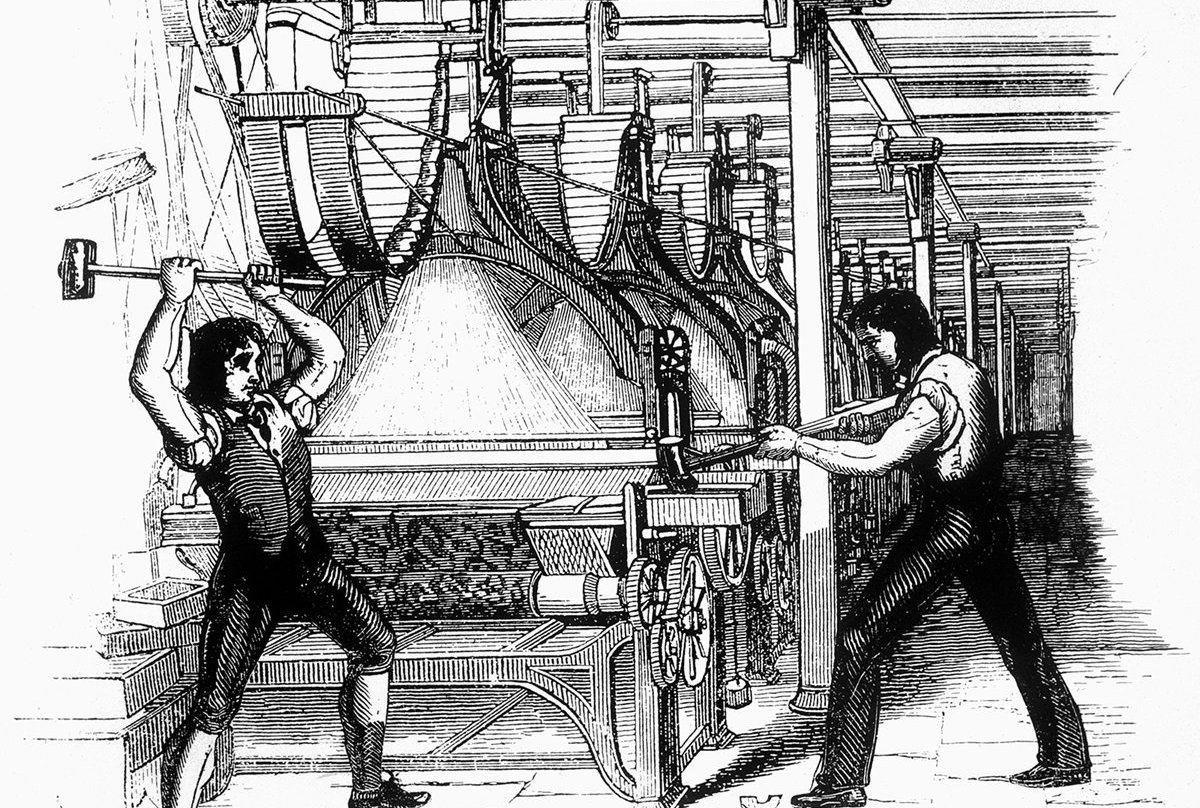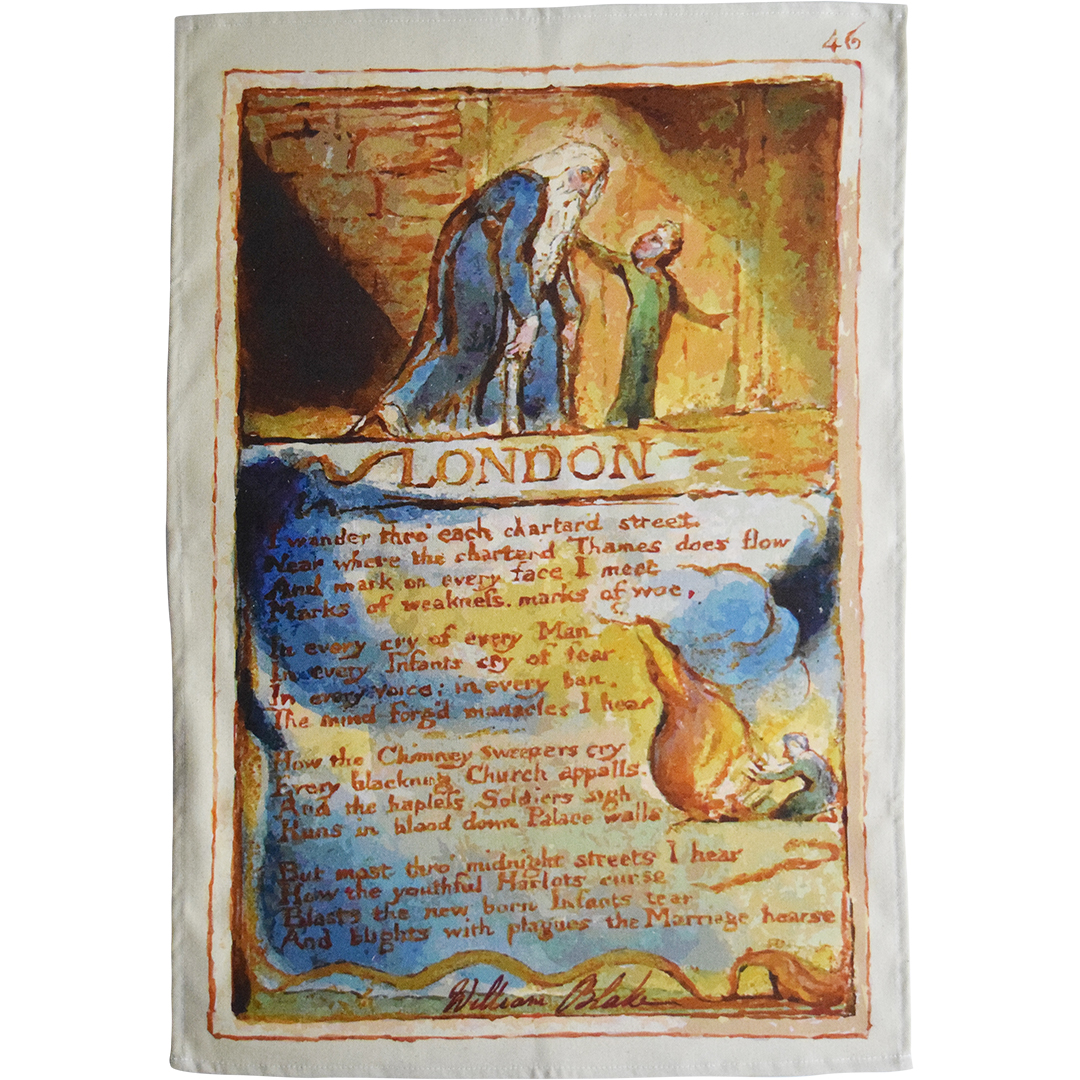The Rise and Fall of the Luddite Movement
Posted by Pete on 9th Mar 2022

They're incredibly relevant to today's political and economic landscape - but who exactly were the Luddites?
What is “progress”?
Is it new technology, making daily life more efficient than ever before? Machines that can do our own jobs for us?
Maybe. But technology doesn’t exist in a vacuum, and these ‘advances’ inevitably raise serious questions for wider society.
Who benefits from a new machine? What good are inventions if they just make the exploitation of people more efficient and poverty more widespread?
These were the questions posed by the Industrial Revolution, and the Luddite Movement was categorical in its response.
Many contemporary poets wrote about the threat posed by the Industrial Revolution to the physical and spiritual health of the people - none more so than William Blake in poems such as 'London'
Click to view our William Blake tea towel
Technological development in the textile sector – especially the invention of the power loom – was undercutting demand for handloom weavers in the early 19th century.
Deployed by wealthy industrialists with state support, the new weaving machines led to job losses and rapidly declining pay.
“Progress” was turning out to be great for profit margins, but terrible for the working class.
So, workers in the textile centres of the Midlands and the North organised and pushed back.
In 1807, a petition with 130,000 signatures was sent to Parliament in favour of a minimum wage.
But MPs rejected it, mostly because it would hurt their own pockets as business owners – Britain wouldn’t have a statutory minimum wage for almost 200 more years.
With the constitutional route blocked off, thousands of workers took alternative measures…
Percy Bysshe Shelley was another poet of the era whose work was inspired by the workers' struggle in Britain
Click to view our Percy Bysshe Shelley tea towel
Starting on March 11th, 1811, workers launched night raids on factories, and handloom weavers began destroying the new machines – machines which had directly led to their impoverishment and had become symbolic of bourgeois indifference.
Originating in Nottinghamshire, the movement then spread to Yorkshire and Lancashire between 1811 and 1813.
These worker insurrectionaries came to be called "Luddites".
The name came from their fictional leader, Ned Ludd. Often given the rank of General or even King, Ludd was supposed to be an apprentice weaver from Leicester who had smashed up machinery in the 1770s.
He was said to hide out in Sherwood Forest, like another legendary champion of the people…
But it didn’t take long for the Government to come down hard on these industrial Robin Hoods.
Britain was still at war with France while the Luddites were active. With the elite afraid that French revolutionary fervour might spread to Britain, there was a huge crackdown on radical activity across the country: the government treated any mass action by the poor as an emergency.
There was some dissent at Westminster – not least from Lord Byron, who pointed out that the weavers wouldn’t be destroying machinery if not for their economic misery.
‘Down with all kings but King Ludd!’ wrote Byron in his protest poem ‘Song For The Luddites’.
But the rich men who ran the government were, on the whole, keen to suppress the Luddite challenge to British capitalism, even if it meant spilling blood.
Revolutionary writer Thomas Paine had been one of the first targets of the British government's crackdown on radical activity
Click to view our Thomas Paine tea towel
In early 1812, machine-breaking was made a capital offence, and several captured Luddites were executed over the next few years.
Textile counties were flooded with 12,000 soldiers, sent to hunt down and kill rebel workers in the mill towns.
By 1817, the Luddite Movement was more or less snuffed out by state violence.
But the end of Luddism was also self-driven.
Worker activists saw the limited effect they were having on the political and economic structures of British society.
They also saw how the lack of proper political representation meant that government would never care about ordinary people: until workers were represented, government would be an ally of the bosses.
So it’s no coincidence that the Luddite Movement fizzled out just as the movement for a larger electoral franchise got going.
Peterloo was just a couple of years after the last Luddite action. And it wasn’t long before the Chartist movement took hold across Britain.
Contemporary opponents of the Luddites would have us believe that the mass machine-breaking of the 1810s was just random criminality.
But it’s better understood as a sustained popular revolt, a key first step in the 19th century struggle for popular democracy in Britain.



